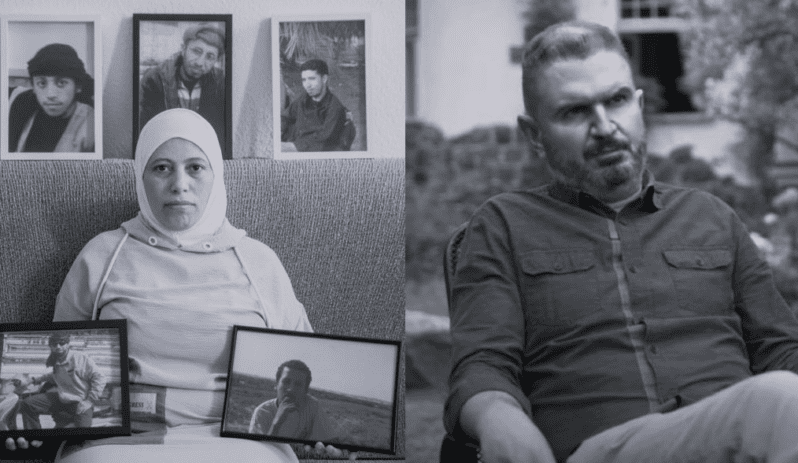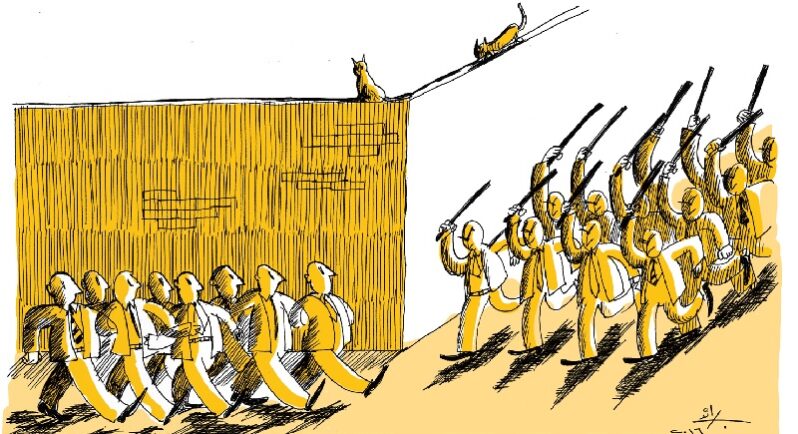Egypt’s Police Superintendents: End of Impunity?

Recent times have witnessed recurring incidents of abuse against citizens by Egyptian police personnel, especially by those occupying the low rank of superintendent [amin al-shurta]. The incident on January 28, 2016, in which superintendents assaulted rotating doctors in the El-Matariya Teaching Hospital, caused a crisis between the Ministry of Interior and the Egyptian Medical Syndicate. On February 12, the Syndicate held an irregular general assembly attended by more than 10,000 doctors.[1] The spectacle spilled out of the Syndicate’s headquarters and onto el-Qasr el-Einy Street in Cairo amidst solidarity from a large number of legal experts and public figures.
In February, a police sergeant killed a taxi driver with a bullet to the head. As a result, residents of el-Darb el-Ahmar –the area in which the victim lived– gathered around the Cairo Directorate of Security chanting against the Ministry of Interior, and demanding that the accused be arrested and put to trial promptly.
The most recent of these incidents occurred on April 19. A police superintendent shot a citizen in el-Tagamoa el-Awal with a machine gun, killing him instantly. When the citizens tried to seize the superintendent, he fired indiscriminately, wounding two others. Citizens rallied after the incident, chanting slogans against the Ministry of Interior.[2]
The aforementioned incidents are only examples of the abuses that occurred during the first four months of 2016.
These abuses have led to more mass mobilization against the Ministry of Interior than has been witnessed at any time during the past three years. If the abuses continue, they will pose a danger to the current regime; indeed, such abuses were one of the main causes of the January 25 Revolution. Egyptian President Abdel Fattah el-Sisi intervened to try to control the situation. El-Sisi met with the Ministry of Interior’s leadership and stressed the need to hold wrongdoers accountable.[3] After the el-Darb el-Ahmar incident, he instructed the minister of interior of the need to pass legislation and take measures to curb this abuse.[4] Subsequently, the Cabinet approved a bill to amend the Police Authority Law, which was then submitted to the State Council’s Fatwa and Legislation Department and referred to Parliament. However, the bill has not yet been debated.
Before discussing the law, I provide an overview of the Egyptian police force and the status of the superintendents. The Egyptian police force is a statutory body in the Ministry of Interior and is divided into a number of sectors on the basis of locality and function. The police cadre consists of police officers, honorary officers, and policemen (police superintendents, police assistants, police inspectors and commissioners, privates and noncommissioned officers, security adjutants, and regular guardsmen).[5] The law governs how persons of each category enter the police apparatus and the requirements that must be met. The law’s provisions distinguish between police officers and policemen. There are around 380,000 policemen, 100,000 of whom are superintendents. Superintendents play a pivotal role in the police force’s work, for they conduct criminal investigations, track forensic work, and they are in charge of exhibits and evidence. Hence, they are an important part of the Ministry of Interior.[6]
In this article, I will shed light on the amendment bill that the Cabinet proposed to Parliament and question its sufficiency for curbing the police abuses currently occurring.
An Overview of the Bill to Amend the Police Authority Law[7]
The bill to amend the Police Authority Law contains a number of provisions. Some pertain to the internal organization of policemen and police officers and their vocational rights to leave, while others directly affect the relationship between police and citizens. In this section, I will focus on the latter provisions.
The proposed amendments impose new duties on police officers. The amendment to Article 41 adds that officers must “respect the Constitution, the law, and human rights standards in the use of authority and force and abide by the standards of integrity, transparency, and procedural legitimacy”. This is the first time that “human rights standards” and insistence on respecting them have appeared in the Police Authority Law. While their inclusion is commendable, officers need to be trained to fulfill these standards and their practical implications.
The article also stipulated that officers must preserve human dignity and, once again, respect human rights standards in relation to the treatment of “accused persons and persons suspected of involvement in committing crimes”. This provision stems from accusations that the Ministry of Interior tortured suspects to extract confessions.
Article 42 banned officers from using force or firearms outside of the situations designated by law. Officers would need to be trained and monitored in this regard, for the mere existence of this text in the law does not necessarily mean that all officers will respect it and implement it.
The bill also adds new articles to the law in order to deter officers and policemen from committing abuses. Paragraph 2 of Article 50 stipulated that an officer [accused of an infraction] must appear before the investigations authority to give his defence not more than 72 hours after the infraction is recorded, and a decision regarding him must be made within 7 days. Similarly, paragraph 2 of Article 55 stipulates that disciplinary proceedings shall not be statute-barred “if the infraction committed constitutes a violation of citizens’ rights or an attack on their freedom”. Consequently, abusers will not escape punishment by virtue of the passage of time.
To resolve the problem of the arrest and remand of policemen and their referral to trial, Article 77 bis 1 stipulated that the Public Prosecution Office must be immediately informed whenever a policeman is accused of committing a misdemeanour or felony, and that said policeman should be held in custody for no more than 24 hours before being presented to the Public Prosecution Office.
To put an end to policemen’s use of their government-issued weapons to abuse citizens, Article 77 bis 3 banned the retention of government-issued weapons as personal ordnance and stipulated that they must be surrendered at the end of duty. However, the article stipulated some exceptions to this principle. If applied broadly, these exceptions may mean that nothing changes in reality.
The aforementioned article banned policemen from misusing or abusing their authority with citizens. Moreover, Article 77 bis 4 stipulated that if a policeman is repeatedly punished for such infractions or demonstrates that he cannot control his nerves or temper, he shall be presented to a specialized committee whose composition includes medical personnel from the psychology and neurology disciplines. The committee shall look into “assigning him to an internal team for psychological and vocational training”. This measure is positive in the sense that it isolates the policeman from the citizens, and aims to treat the root cause.
Are the Proposed Legal Amendments Sufficient to Stop the Police Abuses?
Although the proposed legal amendments are positive and a significant step in deterring police abuses, they are not enough to stop these abuses or eliminate their source.
The Egyptian Initiative for Personal Rights has stated that between November 2015 and March 2016, decisions to investigate and refer to trial, as well as rulings from first instance courts in criminal cases, were issued against at least 14 officers and 16 superintendents. These decisions pertain to cases of beatings and torture and illegally using deadly force. The organization has also indicated that there are cases of violence that have not been investigated at all, or in which the investigations have been discontinued.
Furthermore, the abuses by policemen and police officers are not limited to physical assaults and the use of weapons to abuse citizens. They also encompass threats against people who demand their rights following these abuses. For example, after the doctors of the el-Matariya hospital were attacked, the superintendents of the el-Matariya division pressured them and forced them to abandon their complaint.
These matters raise a serious question about the ability of the law alone to deter these abuses.
Nabil Mustafa, law professor at the Police Academy,[8] has stated that the solution to this crisis lies in organizing training courses to “psychologically, educationally, and culturally retrain policemen in how to deal with citizens”.
Security expert Gamal Abou Zekry, former assistant to the minister of interior, believes that the amendments are positive and will regulate the relationship between policemen and citizens.[9]
Major General Abu Bakr Abdul Karim, assistant interior minister for public relations and media, has stated that the Ministry of Interior is preparing training courses for police superintendents in order to increase their capabilities and experience.[10] This measure reflects an understanding of the problem and a realization that the legal amendment is not the sole solution.
The Egyptian Initiative for Personal Rights has also indicated, in a statement issued on March 12, 2016, that the amendments lack implementation mechanisms as they stipulated no oversight mechanisms and created no new means of enacting accountability. The organization presented a number of suggestions for preventing abuses, such as restricting the use of weapons to specific cases, seriously investigating complaints pertaining to torture, having the Public Prosecution Office perform its role in inspecting detention centres, and establishing an independent committee to investigate all cases of death and serious injury at the hands of policemen.
This article is an edited translation from Arabic.
Keywords:
__________
[1] See the official website of the Egyptian Medical Syndicate.
[2] The news was published in various Egyptian newspapers on April 19, 2016. See, for example,“Eyewitnesses: Policeman Shoots Citizen in Al Rehab”, published on Al-Masry Al-Youm’s website.
[3] See: “el-Sisi Meets the Minister of Interior and His Assistants Orders that Wrongdoers Among the Police Be Held Accountable”, published on Youm7’s website, April 20, 2016.
[4] See: “New Decisions by el-Sisi to Curb Superintendent Abuses”, published on Dostor’s website, February 20, 2016.
[5] See Article 1 of the Police Authority Law.
[6] See: Mohamed Hamama’s, “A Confrontation Between the Interior Ministry and Angry Policemen”, published on the Mada Masr website, February 22, 2016 (published in English on February 24, 2016).
[7] The proposed amendments were published on Youm7’s website on March 12, 2016, under the title: “We Exclusively Publish the Complete Text of the Police Amendments Hours Before It Is Sent to the Deputies”.
[8] See: “Police Begin Reform Measures with Legislation to Improve Relations with Citizens”, published on Veto’s website, February 27, 2016.
[9] Ibid.
[10] See: “Assistant Interior Minister to Media: the ‘el-Tagamoa Incident’ Demeans Us, and the Punishment Will Be a Deterrence”, published on El Watan News website, April 20, 2016.



